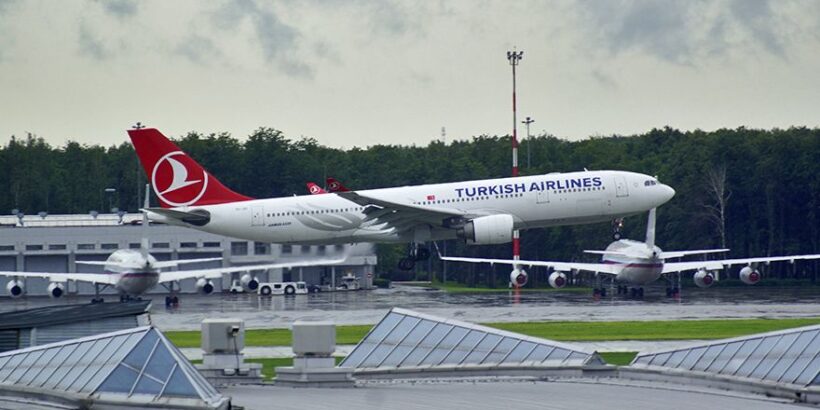Passengers on Turkish Airlines flights from Turkey to Moscow and St. Petersburg are experiencing systematic baggage offloading. Moscow’s Vnukovo Airport reports near-daily incidents of baggage being removed from Antalya-bound flights. These issues began in mid-June and have since become a persistent problem on Russian routes.
In July, Turkish Airlines faced significant baggage delays on flights from Turkey to Russia. According to Pulkovo Airport, between July 20 and 23, approximately 350 claims were filed by passengers for undelivered baggage, with the total number exceeding 500 items. On average, this equates to about 125 pieces of baggage per week reported as delayed. Most delays affected flights from Antalya and Istanbul to Moscow and St. Petersburg, requiring baggage to be forwarded on subsequent flights arriving hours or even days after the passenger’s arrival.
The root cause lies in Turkish Airlines’ commercial decision to maximize fuel loading at Turkish airports, aiming to avoid refueling stops in Russia for cost savings. The carrier operates narrow-body Airbus A320/321 aircraft on Antalya routes, with a maximum range of up to 3,800 miles (6,100 km) at full commercial payload. The typical route to Vnukovo covers about 1,330 miles (2,140 km) and takes roughly four hours—well within the aircraft’s range.
Hot weather in Antalya further complicates operations. At 109°F (+43°C), compared to the standard 59°F (+15°C), and a pressure of 1013 hPa, air density drops by 8.9%. For the Airbus A320/321 in takeoff configuration, this results in a proportional reduction in lift at a given speed and angle of attack.
At a typical takeoff speed of 157 knots (70 m/s) and a maximum takeoff weight (MTOW) of 171,960 lbs (78,000 kg), the aircraft experiences a lift deficit of 15,300 lbf (68 kN or 6.9 metric tons). This imposes strict limitations: to ensure a safe takeoff, the crew must either increase speed (and thus runway length) or reduce takeoff weight by offloading payload.
The thrust output of the Airbus A320/321’s engines (CFM56-5B or V2500) under standard conditions is 24,900 lbf (11,300 kgf) for the A320 and 28,700 lbf (13,000 kgf) for the A321 per engine. At +43°C, air density drops to 91.1% of standard, reducing engine thrust by approximately 7.5%.
For the A320, this means a thrust loss of about 1,870 lbf (850 kgf) per engine (3,740 lbf or 1,700 kgf total), and for the A321, about 2,150 lbf (975 kgf) per engine (4,300 lbf or 1,950 kgf total)1. Combined with reduced lift, these losses create a dual constraint on takeoff performance, forcing the airline to choose between fuel load and baggage weight. Turkish Airlines opts to maximize fuel for the return leg, avoiding refueling in Moscow or St. Petersburg, and compensates by reducing baggage load.
For passengers terminating in Moscow or St. Petersburg, delayed baggage—while inconvenient—can be collected at the airport. However, those with onward connections by air, rail, or bus are deprived of timely access to their belongings, face additional stress, and incur unforeseen expenses. This practice contravenes international passenger transport standards, yet the airline offers only formal apologies without changing its operational model.
Article 17 of the Montreal Convention establishes carrier liability for damage to passengers, including loss or damage to baggage, if the event occurs during the period of carrier responsibility (on board or during carriage). The carrier is obligated to deliver baggage promptly and in accordance with the contract of carriage.
Article 19 of the Montreal Convention addresses carrier liability for damage caused by delay in the carriage of passengers, baggage, or cargo. The carrier is liable for such damage unless it proves that it and its agents took all reasonable measures to prevent the damage or that it was impossible to do so.
Additionally, the International Air Transport Association (IATA) and the International Civil Aviation Organization (ICAO) recommend that carriers minimize passenger inconvenience, including baggage delays, provide timely information, and compensate for incurred expenses. While these recommendations are not legally binding, they are considered industry standards.
By these measures, Turkish Airlines is in violation of Articles 17 and 19 of the Montreal Convention, as well as relevant IATA guidelines, which require timely baggage delivery or adequate compensation and support in case of delay. Mere apologies without operational changes, resulting in regular inconvenience, contradict these international norms and passenger rights. The airline advises passengers to contact the Lost & Found service, file official claims, and retain baggage receipts for subsequent compensation via the carrier’s website.
Russian aviation authorities, including Rosaviatsiya and the Ministry of Transport, are pressuring Turkish Airlines to adjust its loading procedures. Regulators have not ruled out limiting the carrier’s flight quotas if passenger rights continue to be violated. Nevertheless, Turkish Airlines maintains its current practice, citing flight safety requirements.
Other carriers on Turkish routes do not exhibit similar issues. AJet and Pobeda operate Istanbul–Moscow flights with Boeing 737-800 aircraft without widespread baggage offloading. Vnukovo Airport reports that since early 2025, the Russian low-cost carrier has handled approximately 300,000 baggage items, with a delay rate of just 0.13%—well below the industry average of 0.6% (SITA Baggage Report).
Turkish Airlines’ return flights from Moscow to Turkey operate without baggage loading restrictions, confirming the airline’s cost-saving policy on refueling at Vnukovo. The economic rationale is that fuel in Turkey is cheaper than ground handling and refueling in Moscow. The carrier shifts these costs onto passengers, violating their contractual rights and prioritizing profitability over customer service.
This situation highlights a conflict between the airline’s commercial interests and consumer rights. Turkish Airlines effectively compels passengers to subsidize its fuel savings at the expense of timely baggage delivery, setting a negative industry precedent and necessitating regulatory intervention. Passengers are advised to document baggage delays, contact airport Lost & Found services, and file complaints with Rosaviatsiya if delivery deadlines are missed. Systematic documentation of incidents will strengthen regulators’ positions in negotiations with the carrier.
* * *
[1] Calculations were performed and verified using neural networks (ChatGPT, Perplexity, DeepSeek). Accuracy confirmed by a source at the Gromov Flight Research Institute.


